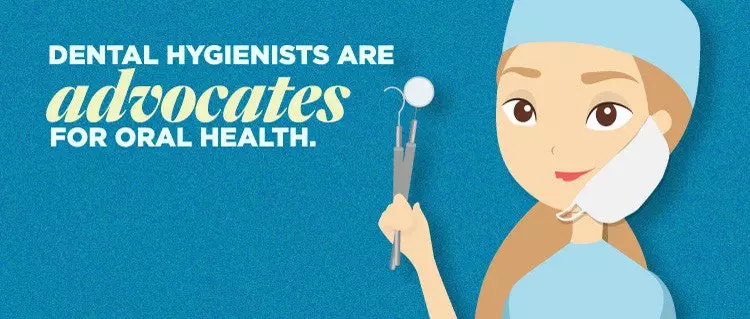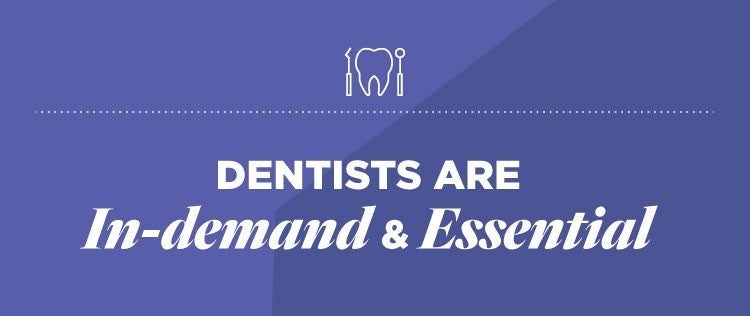
What Do Dental Hygienists Do?
7 min readReviewed By : Ramsey Michael
Published: May 20, 2023
Education Requirements for a Student Dental Hygienist
The state where hygienists work sets the education requirements hygienists must meet. However, dental hygienist schooling has some standard requirements. For example, all dental hygiene programs in the US must be accredited by CODA (Commission on Dental Accreditation).
- Entry-Level: These programs are for the student dental hygienist with no experience. These programs could include associate degrees, baccalaureate, and post-baccalaureate degree programs.
- Degree Completion: Following the completion of a certificate or associate degree program, these students can advance their education to a program to earn a bachelor's degree in dental hygiene or a similar field.
- Graduate: After obtaining a bachelor's, dental hygienists can get their master's in dental hygiene or a similar field. [1]
Check out the Dental Boards' comprehensive list to find out what your state board requires.
Please visit the national dental hygienists' association, ADHA (American Dental Hygienists Association), for additional resources.

What Does a Dental Hygienist Do?
Hygienists also manage oral disease. Sometimes they perform procedures like scaling and root planing to treat gum disease. Scaling removes plaque and tartar from patients' teeth below the gumline. Root planing involves smoothing the tooth's roots, which can help the gum reattach to the teeth. [2]
- Getting patients' dental impressions, either digitally or with impression material
- Administering sealants to prevent tooth decay
- Providing fluoride treatments to strengthen enamel
- Giving anesthesia as needed for restorative or other treatments
- Removing sutures after dental procedures
The Difference Between a Dental Hygienist and a Dentist
The Difference Between a Dental Hygienist and a Dental Assistant

What to Expect Regarding a Dental Hygienist Salary
There are a range of salary amounts for dental hygienists. Per the US Bureau of Labor and Statistics (BLS), hygienists will earn a median income of $77,810 or around $37 hourly in 2021. However, the BLS says that the lowest ten percent of dental hygienists in the US earned about $60,000, while the highest was around $108,200. [3]
Dental Post, the dental industry's largest online and mobile job board, published in their 2023 Dental Salary survey an average income of $73,745 with a median income of $72,000, based upon their respondents. [4]
Where Do Dental Hygienists Get Paid the Most?
How much you make as a dental hygienist also depends on where you live. Generally, dental hygienists in the US make the most in the bigger cities across the US. For example, dental hygienists make $94,208 in New York, NY. [5] However, dental hygienists in Birmingham, AL, make a little over $74,000. [6] The highest-paid dental hygienists live in the West Coast states and the eastern seaboard, with a range of $84,000 to $116,000. Colorado and New Mexico also fall within that highest range for salaries. [7]
Job Satisfaction of a Dental Hygienist
Is Being a Dental Hygienist Hard?
Is Being a Dental Hygienist Worth It?
Hygienists enjoy many perks. Also, dental hygienists can have flexible work schedules, with full- or part-time positions available. [8] Plus, they have a lot of autonomy during the day, which appeals to many dental hygienists. Many perceive their role in oral healthcare as a rewarding career. The time they spend with patients, more substantial than anyone else in the dental practice, allows them to build rapport with their patients.
With the industry-wide shortage of dental hygienists, there are many opportunities for dental hygienists today. The increased demand for their skills and training makes it easier for hygienists to find a dental practice that is a good fit. [9]
Hygienists are more valued than ever, providing more opportunities for growth after clinical practice. Per the American Dental Education Association (ADEA), many career paths exist for dental hygienists outside the operatory in education, research, administration, public health, and business. From a classroom instructor to a dental supplies sales job to a local or state dental public health officer, there are numerous career opportunities after or instead of clinical work for dental hygienists. [10]

The Benefits of Working as a PDS-supported Hygienist
If you are a dental hygienist looking for a culture that values your contribution and provides opportunities for career advancement and mobility, view our dental hygienist jobs now at the link below. In addition, for senior dental hygiene students or unlicensed graduates, we offer the Hygienist-in-Training (HIT) pathway. HIT is a paid opportunity that allows participants to begin working in a dental practice, giving them a head start on building competence in a patient-centric environment.
Check out the Life at PDS video of a PDS-supported dental hygienist in Knoxville, TN.
Sources
- [1] US News. (n.d.). Dental hygienist - career rankings, salary, reviews and advice | US ... US News. https://money.usnews.com/careers/best-jobs/dental-hygienist
- [2] Zawacki, A. (2023, February 28). Reasons a dental hygienist career could be right for you. Carrington College. https://carrington.edu/blog/12-reasons-a-career-as-a-dental-hygienist-could-be-right-for-you/
- [3] US News. (n.d.). Dental hygienist - career rankings, salary, reviews and advice | US ... US News. https://money.usnews.com/careers/best-jobs/dental-hygienist
- [4] US News. (n.d.). Dental hygienist - career rankings, salary, reviews and advice | US ... US News. https://money.usnews.com/careers/best-jobs/dental-hygienist
- [5] US News. (n.d.). Dental hygienist - career rankings, salary, reviews and advice | US ... US News. https://money.usnews.com/careers/best-jobs/dental-hygienist
- [6] US News. (n.d.). Dental hygienist - career rankings, salary, reviews and advice | US ... US News. https://money.usnews.com/careers/best-jobs/dental-hygienist
- [7] US News. (n.d.). Dental hygienist - career rankings, salary, reviews and advice | US ... US News. https://money.usnews.com/careers/best-jobs/dental-hygienist
- [8] Zawacki, A. (2023, February 28). Reasons a dental hygienist career could be right for you. Carrington College. https://carrington.edu/blog/12-reasons-a-career-as-a-dental-hygienist-could-be-right-for-you/
- [9] US News. (n.d.). Dental hygienist - career rankings, salary, reviews and advice | US ... US News. https://money.usnews.com/careers/best-jobs/dental-hygienist
- [10] Zawacki, A. (2023, February 28). Reasons a dental hygienist career could be right for you. Carrington College. https://carrington.edu/blog/12-reasons-a-career-as-a-dental-hygienist-could-be-right-for-you/
The information provided by Pacific Dental Services in this blog is intended to educate readers about oral health and related topics. However, it is not a substitute for professional advice or career guidance from a qualified dental professional or educator. It is important to seek the help of experts for any concerns related to oral health or career planning.




